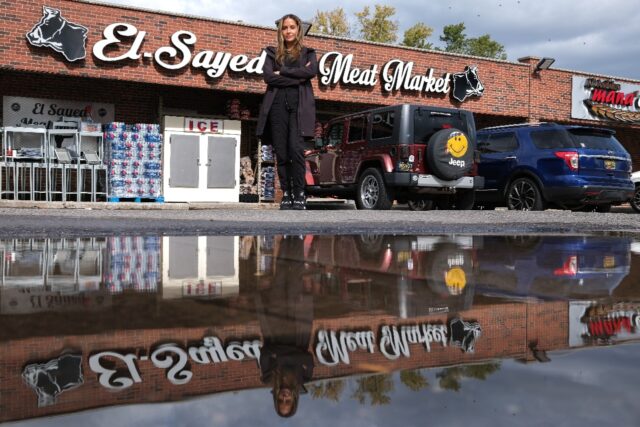Iman Beydoun El-sayed is among the thousands of Lebanese-Americans living in and around Detroit, watching with horror the unfolding devastation of the war in the Middle East.
“I’ve always voted more Democrat. I’ve always been a Democrat, but with what’s going on, I’m not sure how I feel about that anymore,” she said.
Like many in her community, she is contemplating denying the Democratic contender for president Kamala Harris her vote to punish her administration for its support of Israel.
El-sayed, 37, a native of Michigan with Lebanese roots, left her deli in Dearborn Heights to raise donations for the situation in Lebanon.
Since mid-October, Israel’s intensifying campaign against Hezbollah militants has claimed 1,500 lives, including civilians, and displaced more than 800,000 people, the United Nations says.
“We all have relatives, friends, family victims, back home,” said El-sayed, who wore a sweatshirt emblazoned with Lebanon’s cedar tree emblem.
“The fact that no candidate is speaking of a ceasefire or an arms embargo is pretty disheartening,” she added, suggesting she would probably vote for Green party candidate Jill Stein.
In 2020, Wayne County, which includes Detroit and its suburbs, voted 68 percent for Joe Biden, contributing to his 150,000-vote victory over Donald Trump in the important swing state.
Ronald Stockton, a retired professor of political science at the University of Michigan-Dearborn and an expert on the Middle East, said Americans with roots in Arab countries number around 300,000 in Michigan and were instrumental in Biden’s win.
Former president Donald Trump “had angered Arab Americans with his anti-Muslim and pro-Israeli policies. And so they voted very strongly for Biden in 2020,” Stockton said.
‘Slap in the face’
Dearborn’s history is inextricably linked to the motor industry and the waves of immigration that accompanied its expansion in the 20th century.
Henry Ford’s hometown elected its first Muslim mayor in 2022, and the automaker’s factories stand alongside America’s largest mosque.
With two weeks to go before the November 5 vote, there is palpable anger with the Biden administration, accused of blindly backing Israel with financial and military aid, as well as with vetoes at the United Nations against calls for a ceasefire in Gaza.
For Marwan Faraj, a 51-year-old entrepreneur who arrived from Lebanon 35 years ago, Democrats have ignored the February primary, when more than 100,000 voters cast blank ballots to protest Washington’s Middle East policy.
“It’s a slap in the face, and we should return that,” he said as he sat in Qahwah House, a Yemeni chain cafe.
“They have been supporting this ethnic cleansing and genocide since day one, with our tax dollars, and that’s wrong,” Faraj added.
Unlike in 2020, when it supported Joe Biden, the Arab American Political Action Committee, an influential local political organization, called for a vote “for neither Harris nor Trump.”
The organization said that both Harris and Trump “blindly support the criminal Israeli government led by far-right extremists, including Prime Minister Benjamin Netanyahu.”
Anger with the war
Stockton said anger with the war goes far beyond the Arab-American community, touching many young people and making the conflict a “dangerous” issue for the Democrats.
Some in the community nonetheless have sounded the alarm on the dangers of Trump, who instated a “Muslim ban” on travelers from several Muslim-majority countries and moved Washington’s embassy in Israel to Jerusalem.
“We have no choice but to vote for Kamala Harris,” Ismael Ahmed, a veteran of the Democratic Party and a vocal advocate on Arab-American issues, wrote in the Detroit Free Press.
“Kamala Harris is calling for a cease fire and a two-state solution” while Donald Trump “refuses to acknowledge the occupation of Palestinian lands, opposes an independent Palestinian state and steadfastly supports Israeli Prime Minister Benjamin Netanyahu,” he said.
For one Dearborn Heights-based imam, Mohammad Ali Elahi, voters are “so frustrated and so heartbroken that they are not thinking about that calculation, they think ‘what would be worse (than what) you already see.'”
Voters question how the situation in Gaza and Lebanon could be worse, said the cleric, who is originally from Iran.
Lebanon-born activist Micho Assi, a Democratic community activist, said local people have become disillusioned.
“Normally, I would be mobilizing and knocking doors and trying to get out the vote. Right now, I cannot do the same,” she said.
“People right now, they’re focused on who’s going to stop that genocide. If I tell them, ‘get out and vote,’ they tell me, ‘I don’t care, (their votes are) not going to matter when it comes to genocide.'”
The conflict is dominating for her too.
Last week, she welcomed her parents at Detroit airport after they fled southern Lebanon.
Visibly emotional, she brandished a bouquet of flowers and colorful signs bearing the US and Lebanese flags as she awaited their arrival.

COMMENTS
Please let us know if you're having issues with commenting.